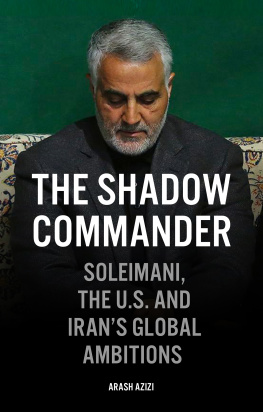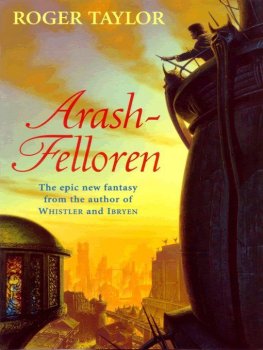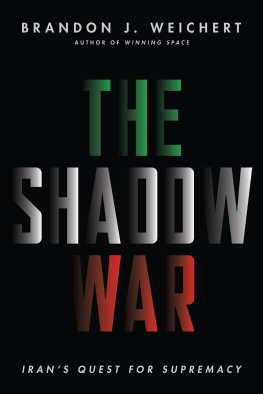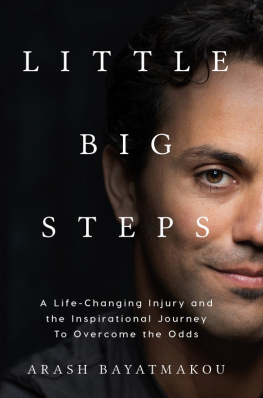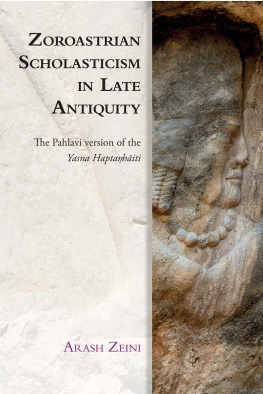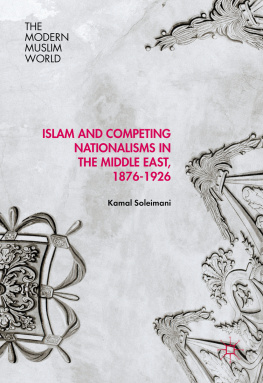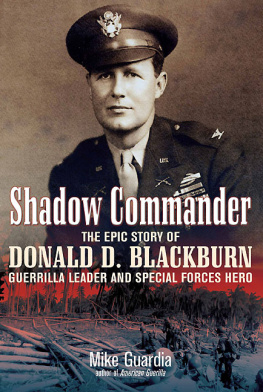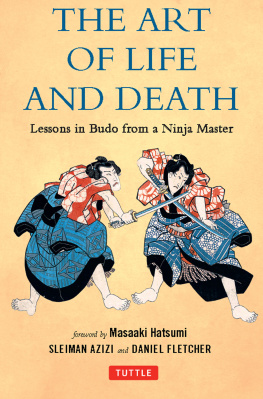Arash Azizi - The Shadow Commander: Soleimani, the US, and Irans Global Ambitions
Here you can read online Arash Azizi - The Shadow Commander: Soleimani, the US, and Irans Global Ambitions full text of the book (entire story) in english for free. Download pdf and epub, get meaning, cover and reviews about this ebook. year: 2020, publisher: Oneworld Publications, genre: Non-fiction. Description of the work, (preface) as well as reviews are available. Best literature library LitArk.com created for fans of good reading and offers a wide selection of genres:
Romance novel
Science fiction
Adventure
Detective
Science
History
Home and family
Prose
Art
Politics
Computer
Non-fiction
Religion
Business
Children
Humor
Choose a favorite category and find really read worthwhile books. Enjoy immersion in the world of imagination, feel the emotions of the characters or learn something new for yourself, make an fascinating discovery.
- Book:The Shadow Commander: Soleimani, the US, and Irans Global Ambitions
- Author:
- Publisher:Oneworld Publications
- Genre:
- Year:2020
- Rating:5 / 5
- Favourites:Add to favourites
- Your mark:
- 100
- 1
- 2
- 3
- 4
- 5
The Shadow Commander: Soleimani, the US, and Irans Global Ambitions: summary, description and annotation
We offer to read an annotation, description, summary or preface (depends on what the author of the book "The Shadow Commander: Soleimani, the US, and Irans Global Ambitions" wrote himself). If you haven't found the necessary information about the book — write in the comments, we will try to find it.
Arash Azizi: author's other books
Who wrote The Shadow Commander: Soleimani, the US, and Irans Global Ambitions? Find out the surname, the name of the author of the book and a list of all author's works by series.
The Shadow Commander: Soleimani, the US, and Irans Global Ambitions — read online for free the complete book (whole text) full work
Below is the text of the book, divided by pages. System saving the place of the last page read, allows you to conveniently read the book "The Shadow Commander: Soleimani, the US, and Irans Global Ambitions" online for free, without having to search again every time where you left off. Put a bookmark, and you can go to the page where you finished reading at any time.
Font size:
Interval:
Bookmark:
Acknowledgments
Sometime in the fall of 2018, publisher Novin Doostdar asked me if I knew someone who could write a book on Qassem Soleimani. I jumped at the question. The life of the Iranian general had long fascinated me. It had obvious relevance to my prime area of interest and scholarship, the ties that bind Iran to the Arab world. This had been my beat as a journalist and it was the subject of my doctoral studies. I wanted to write this book.
It helped that I already had copious files and notes on Soleimani and his Quds Force as well as contacts in the world of multinational Shia soldiers he commanded. I continued to discuss the idea of a book with Novin over several lunches and dinners in London and New York. In May 2019, I committed to writing the book but this was still slow work. Then, on January 3, 2020, Qassem Soleimani was killed. I knew his story had to be told now. The result is the book you now hold in your hands.
My gratitude goes to a long list of men and women without whom I would have been nowhere near the position of writing this book. My mother Mitra Mansouri was not only my first feminist hero but inspired me to look at the world with a creative eye and has been a constant rock of support my entire life.
In the Tehran of my early teen years, Marxist publisher Parviz Shahriari trusted a kid who loved Lenin and was into computers with writing for the esteemed journals he edited. Later on, the great Alireza Rajayi published a book I had translated and mentored me over unforgettable Cholo Kabab lunches. The leading light of journalism in the Iran of my youth, Rajayi could have been a great member of parliament if he hadnt been robbed of an obvious victory in 2000. It pains me that he has been robbed of much more since, while heroically standing up to years of prison and torture. I will be forever grateful to him.
Mohammad Qoochani and Hadi Khosrow Shahin were my first real editors. When I was an awkward teenager with radically different politics than theirs, they gave me writing positions I could only dream of. The years of writing for Shahrvande Emrooz are still among my sweetest and I continue to believe that its quality rivaled the best of current affairs journals anywhere in the world. Matin Ghaffarian was much more than another editor. Not only did he entrust me with the international editor position at the newspaper Kargozaran at the age of nineteen, he taught me more than I could ever recount.
I am grateful to Qoqnoos Publications boss Amir Hosseinzadegan for publishing my first books of translation in Persian. The amazing chief editor at Qoqnoos, Arslan Fasihi, taught me how to respect prose. To this day, he is my ostaad and not only in prose. In those good days of Tehran, Kamran Malakmotiee patiently tolerated my questions by telling me what to read, what to watch, and where to visit in Tehran and the world. I hope he knows how much Ill owe him for the rest of my life.
In Toronto, I was fresh off the plane when Michael Petrou generously opened my eyes to the world of Western journalism. I wish to learn from his kindness and good spirits. The unforgettable duo of Hassan Zerehi and Nasrin Almasi, publishers of Torontos Shahrvand , gave me hope that exilic Persian journalism can be of the highest quality.
I met Constance Dilley in Toronto during a local film festival but I cant imagine I once lived without her friendship and advice. I couldnt teach her Persian very well but she has taught me endlessly not only about journalism and scholarship but simply about being a good person. Every chapter of this book owes something to her.
At BBC Monitoring, I learnt so much from the talented men and women who lived and breathed the world of news. As many of them work away from the public eye, I wont name them for fear of prejudicing their situation. You know who you are.
At Manoto, Kayvan Abbasi trusted a young man with next to no broadcasting experience to fly around the world and cover the most important stories of our time while giving me full autonomy. I will always be grateful to him, to my editor there, Pouria Zeraati, and to my newsroom colleagues Pantea Modiri, Armin Qobadi Pasha, Shabnam Shabani, Sheyda Hooshmandi, and Sanaz Qaziadeh.
In the world of academia, Ive been immensely lucky to learn from some of the best scholars in the world. At the University of Toronto, Ato Quayson, Anna Shternshis, and Antonela Arhin opened my eyes to a world beyond methodological nationalism. I was blessed to again overlap with Professor Quayson years later at New York University. He remains a primary role model. At the Free University of Berlin, Sebastian Conrad showed me how to think about history magisterially. His answer to what is history about, given to me in a crowded coffee shop near the New School in New York, remains a guide to my scholarly life. Khodadad Rezakhani taught me how to read texts with the patience of a scholar of centuries past. Joseph Ben Prestel made me see Europe and the Middle East in a single frame. Nora Lafis passionate yet erudite lessons helped me see the Ottoman legacies that shape our current world. Nadin He was the best professor, advisor, and mentor I could dream of. Her serious erudition on topics as diverse as Japanese fascism and German environmentalism comes with a joie de vivre that I wish we could all replicate.
Without working as an assistant for Lior Sternfeld, I would have never started a PhD. On some days, I am even grateful to him for this. I hope I can make him proud one day.
At NYU, Ive benefited from a galaxy of scholars who sometimes also allow me to call them comrades. Zachary Lockman, Arang Keshavarzian, Sara Pursley, Ali Mirsepassi, and Ayse Baltacioglu-Brammer are as formidable a team of Middle East scholars as anyone could imagine. This is where Murphys Law goes to die since its definitely too good to be true. Whether it is the art of social-relational history, the significance of borderlands, legacies of nativism, or the roots of sectarianism, Ive learnt from them so much of what little I know. Outside my core department, Mary Nolan taught me the very basics of history, Frederick Cooper and Jane Burbank showed me how to work with flexible historical categories, Chen Jian rekindled my passion for the study of the Cold War, and Pedro Monavilles class on the Global Sixties forever changed my view of twentieth-century history. I am also grateful to Olga Verlato, Zavier Wingham, and Gabriel Young, my lovely cohort; we held hands as we passed through the storm of doctoral studies together. The same is true about Amy Fallas, Arran Robert Walshe, Zachary Cuyler, and Professor Golbarg Rekabtalaei, who never left me alone on this journey.
That I can directly learn from some of the giants of Iranian studies is still surreal to me but Ive come to believe it is real. Even if I can never write as gracefully as Negar Mottahedeh, I will continue to learn from her. My inspiration from Roham Alvandis joyful love for Cold War history is only surpassed by his unapologetic love for our common homeland Iran. Ervand Abrahamian might be the grand scholar on whose history books we all grew up; but he is also forever as curious and engaging an interlocutor as anyone can dream of.
My grandmothers Sediqe Paki and Hajbibi Mesdaqi and late grandfathers Hajj Seyyed Morteza Azizi and Asghar Mansoori taught me the stories of Iranian and Shia lore from before I could read. The vivid mark they left on my imagination will never leave. That my mothers family hails from Kerman gave me a strong personal connection to the story and a resource for reconstructing the Kerman of the old days. I am indebted to my aforementioned mother, Mitra, and to her sisters, Soheila and Simin Mansoori, for the wondrous tales of their hometown.
On the other side of the family, Parastoo, Omid, Afsane, Elahe, and Hanie Azizi; Fariba Mohajerani; Tofigh and Elnoor Torabi; and Mohammad, Zeynab, Sepide, and Amir Mohammad Salarvand are not only an awesome paternal family cabal. They make me feel like Ive never left the Tehran of my birth.
Next pageFont size:
Interval:
Bookmark:
Similar books «The Shadow Commander: Soleimani, the US, and Irans Global Ambitions»
Look at similar books to The Shadow Commander: Soleimani, the US, and Irans Global Ambitions. We have selected literature similar in name and meaning in the hope of providing readers with more options to find new, interesting, not yet read works.
Discussion, reviews of the book The Shadow Commander: Soleimani, the US, and Irans Global Ambitions and just readers' own opinions. Leave your comments, write what you think about the work, its meaning or the main characters. Specify what exactly you liked and what you didn't like, and why you think so.

